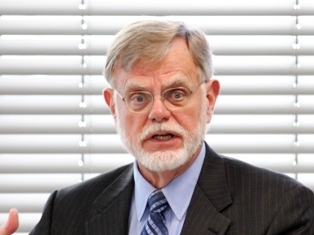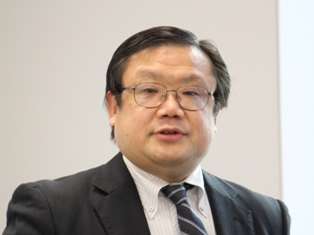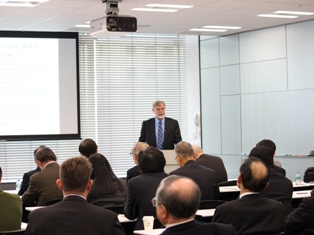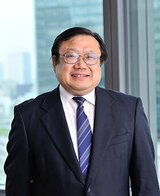Event Report International Exchange
CIGS Seminar:"The US-Japan relations: A perspective from Conservative Internationalism"
January 23, 2014,
10:00
- 12:00
Venue: CIGS Meeting Room 3



(Professor Henry R. Nau, Mr. Jun Kurihara from the left)
Presentations
Presentation by Mr. Jun KuriharaPDF:166KB
Presentation by Professor Henry R. NauPDF:312KB
Seminar's outline
Title: "The US-Japan relations: A perspective from Conservative
Internationalism"
Speaker: Henry R. Nau
Professor of Political Science and International Affairs; Director,
U.S-Japan-South Korea Legislative Exchange Program
(The George Washington University)
Moderator: Mr. Jun kurihara, Research Director, CIGS
Abstract
Is America pivoting to Asia or out of the world? President Obama pursues
a diplomacy that reserves the use of force as a last resort after diplomacy
fails. Professor Nau discussed an armed diplomacy that uses force before
and during not just after negotiations. Based on his new book, he spelt
out a conservative rather than liberal internationalist approach to
American diplomacy in Asia. What does it mean for trade with China, TPP,
U.S. and Japanese economic recovery, and the global environment?
Speaker's introduction
Henry R. Nau holds a B.S. degree in Economics, Politics and Science from the Massachusetts Institute of Technology, and M.A. and Ph.D. degrees from The Johns Hopkins University School of Advanced International Studies (SAIS). His latest book, Conservative Internationalism: Armed Diplomacy Under Jefferson, Polk, Truman, and Reagan was published August 2013 by Princeton University Press.
Professor Nau directs the US-Japan-South Korea Legislative Exchange Program, semiannual meetings between Members of the US Congress, Japanese Diet, and Korean National Assembly. Previously, he taught as Assistant Professor at Williams College (1971-73) and as Visiting Professor at Johns Hopkins SAIS, Stanford, and Columbia Universities. During academic year 2011-12 he was the W. Glenn Campbell and Rita Ricardo-Campbell National Fellow and the Susan Louise Dyer Peace National Fellow at the Hoover Institution, Stanford University. He has received numerous grants from, among others, the Woodrow Wilson International Center for Scholars, Council on Foreign Relations, Century Foundation, Japan-US Friendship Commission, Rumsfeld Foundation, and the Lynde and Harry Bradley Foundation.
From January 1981 to July 1983, he served on President Reagan's National Security Council as senior staff member responsible for international economic affairs. Among other duties he was the White House sherpa for the Annual G-7 Economic Summits at Ottawa (1981), Versailles (1982), and Williamsburg (1983) and a special summit with developing countries at Cancun, Mexico (1982). He also served, in 1975-1977, as Special Assistant to the Under Secretary for Economic Affairs in the Department of State. In 1977, he received the State Department's Superior Honor Award.
A member of Phi Beta Kappa and Council on Foreign Relations, he served two years as a Lieutenant in the 82nd Airborne Division at Fort Bragg, North Carolina.
